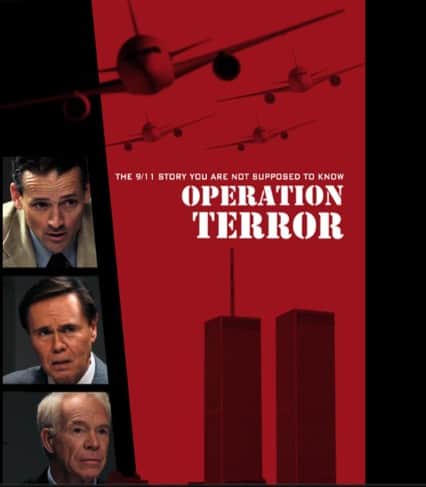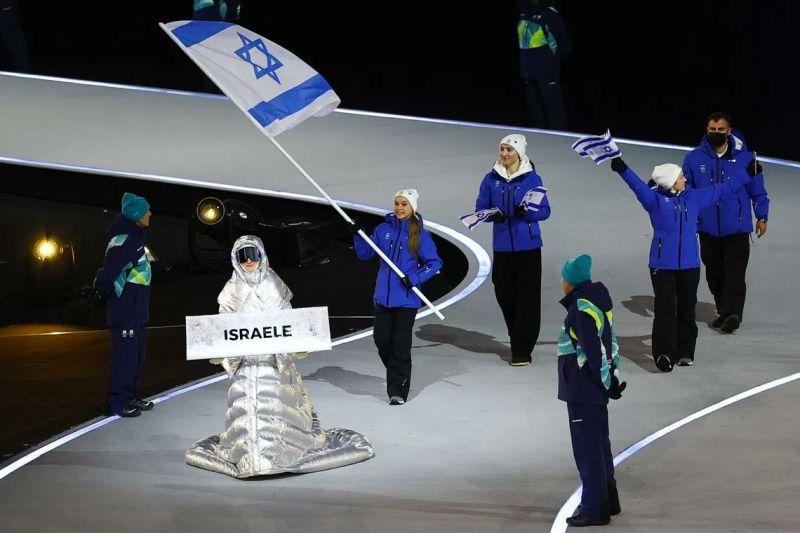While researching my next 9/11 blog post—about the many anomalies of the planes on September 11, 2001—I went through the recovered forum threads for the now-defunct website of Pilots for 9/11 Truth. In doing so, I learned, for the first time, of a 2012 movie about 9/11 that I’d never heard of—Operation Terror.

There are a ton of videos about 9/11. But this one’s different. It’s a drama that tells the story from the perspective of Deep State oligarchs who wanted it, and Deep State operatives who planned and executed it.
I downloaded the film from Amazon. I personally liked it very much. I say “personally” because taste in movies varies so much amongst individuals. Some people will love the movie; others may dislike it. I expect that those who dislike it will do so either because they’re accustomed to big-budget films with big-name actors, or (more likely) because elements of the film contain hypotheses that disagree with their own theories of how certain dimensions of 9/11 were carried out. Sure, the film depicts the CIA directing 9/11 without reference to Mossad, but only so many details can be packed into a screenplay plot.
With those disclaimers said, I was amazed at how seamlessly writer-producer Art Olivier weaved in dozens of 9/11 elements that have been proven to be true. Many real-life characters are portrayed—Dick Cheney, Norman Mineta, Scooter Libby, Osama Bin Laden, Jane Standley, Mohamed Atta, Barry Jennings, Zacarias Moussaoui, as well as others whose names were slightly changed.
I was impressed by Operation Terror’s production values—pacing, dialogue, acting, cinematography, music, and the directing of Paul Cross (who also plays a role in the film).
Art Olivier has also had a very active career in politics. He was the mayor of Bellflower, CA in the late 1990s, the Libertarian Party’s Vice-Presidential nominee in the 2000 U.S. Presidential race, and the Libertarian Party candidate in the 2006 California gubernatorial election, won by Arnold Schwarzenegger.
He was kind enough to give me his time for an interview. My comments and questions are in bold; Art’s answers in normal font.
First of all, Art, I want to commend you for the outstanding work you did on Operation Terror, both as the screenwriter and producer. You did an amazing job of weaving into the story’s flow so many elements of 9/11, from “the New Pearl Harbor” to Jane Standley pre-announcing the collapse of Building 7, as well as traditional elements of the Deep State itself, from Bohemian Grove to “The Council on Foreign Affairs”—and we all know what was meant by that.
Thank you.
One thing that puzzles me is that in all my years connected to 9/11 Truth, I had never heard of this movie until now. What can you tell us about censorship the movie faced?
My plan was to advertise on Prison Planet and Infowars, but they wouldn’t take my money. Some of the supporters of my movie tried to write about it on the Prison Planet and Infowars blogs, but if they typed the words “operation terror,” their post was immediately deleted. I pitched the movie at the American Film Market in Santa Monica. On the first day, I had 25 distributors that were interested in the movie, but the next day they all looked at me like I had leprosy. A couple of them told me that they could make money on the movie, but at the risk of getting their whole business shut down.
If I was going to write a screenplay about 9/11, I would have done it from the perspective of an investigator. But you chose a unique path—telling it from the viewpoint of the bad guys. How’d you come up with that idea?
The idea for the movie started when I saw the passenger lists for the four flights that were involved on 9/11. It seemed that about half of the passengers had defense-related jobs. Being that I had worked in the aerospace industry, I found it unusual that so many people in the defense industry would be on those planes. Following these passengers from two years before the attack to the day of the attack was much more seamless than an investigative approach where you go back-and-forth in time.
In the movie, the Deep State hires contractors to work on highly technological elements of 9/11. But it’s all compartmentalized. The contractors don’t see the big picture, because it’s all on a “need to know” basis and “That’s above your pay grade.” One reason I find this authentic is that I have a friend, author Rachael McIntosh, who fictionalized her real-life employment at one of America’s top six defense contractors. In the late 1990s, they were asked to develop airport full body scanners and luggage scanners, like TSA uses now. They didn’t know why—it was compartmentalized.
Compartmentalization is a necessity in many operations. The Manhattan Project is a perfect example. Had I made money on Operation Terror, my next movie would have been Major Jordan’s Diaries. Major Jordan oversaw the Soviet Lend-Lease shipments out of the air base in Great Falls, Montana. Because Jordan was unaware of the goals of the Manhattan Project, he sent the plans and materials to build an atomic bomb to the Soviets during World War II.
During the production of Operation Terror, only the director and myself had access to the entire screenplay. I was worried that if the screenplay got into the wrong hands, I could get shut out of some of my locations, and I would have been stuck paying the cast and crew for the day. When I ran for governor, half of my appearances were canceled at the last minute. The hosts for the half that were not canceled, told my staff that they were threatened or bribed by the Schwarzenegger campaign. I certainly didn’t want that repeated with the movie.
One thing I like in the film is how one of the contractors, George Poole, starts asking questions; he doesn’t see how his project could possibly relate to “national security.” He was an important character—there are so many perps in this movie, a “good guy” was needed for balance. I’ve seen old film noirs where there were no heroes—just villains and degenerates. I turn those off. A movie needs someone you can root for.
Yes, every good movie has a protagonist and an antagonist.
In watching the actor credits at the film’s end, there were about 150. I myself didn’t recognize the actors, but that’s because I’m an old-timer who prefers classic movies to so much of what now comes out of Hollywood. When I reviewed your cast on IMDB, I found that most of your principal actors had dozens—if not hundreds—of TV and movie credits. They were pros, not amateurs. I have to ask: Since this was your first film, how were you able to contact and assemble such a large and professional cast?
Paul Cross, the director, and I, went through over 1000 actors in our casting to get to our 75 paid actors. The rest of the cast were extras. For Paul, it was a labor of love. He was in Washington DC on 9/11 doing a documentary on the Bush White House. He went to the Pentagon to observe the damage, and he told his partner, “There was no plane that crashed here. Look at the lawn, it’s in perfect shape. Look at those big wire spools, a plane would have had to go through them. If this is a lie, then everything that happened today is a lie.” It was a very difficult time for Paul because he was a lifetime Republican who really believed in his government. He went into a state of depression for two years after witnessing the lie firsthand.
I’m curious to know if any of the actors wanted to be in this film because they already knew the government lied to us about 9/11.
Most of the cast and crew knew little about 9/11 before the movie, but became truthers after looking into it.
I listened to the commentary on the film that you did with director Paul Cross. I had to laugh at one point, because he said that the actor who played Dick Cheney did such a good job of making the Vice President vicious and arrogant that Paul started disliking the actor himself.
That’s funny, because Christopher Wiles, the actor who plays Dick Cheney, is the nicest guy. Most of the cast disliked Circus Szalewski who played the big shot from the council. Circus is a brilliant actor who gets into character before his performance, so he needed to be superior to everyone else.
Moments that had me burst out laughing during the film were when Aaron Delgado, the CIA operative who’s in charge of the overall operation, is looking at the hole in Shanksville and says, “You’d have to be one brain-dead m**********r to buy into all this s**t!” And when he shouts at Jane Standley on the TV, “Turn around, bitch!”
Ha! Richard Gage said the same thing about the Jane Standley scene.
IMDB estimates the budget of this film at $100,000. That seems impossible. Is it correct?
That is correct. I saved some money by being the prop manager and the location manager. I built the interior of the E4-B in my garage and I had numerous other scenes filmed at my house.
I have to say one more thing. I was impressed by how the movie explains the fate of the plane passengers. I’d never seen that anywhere else in 9/11 literature. I won’t give it away, of course, because that would be a “spoiler.” But when I checked the circumstances with AI, it might have been possible.
The dramatic demise of the passengers was just an educated guess. I was shocked when I read shortly after the movie was released, that the remains of the passengers matched with what happened to them in that scene. Who knows, perhaps that was why it was so important to stifle the publicity for Operation Terror.
By the way, I see your latest project, out this year, is a novel called Sandy Hooked. Do you have any other ventures on the horizon?
I wrote a screenplay called Rachel Forever. It is a story about Rachel Corrie and her parents’ efforts to get justice for Rachel and immortalize her. The film would’ve been shot in Olympia, Washington, where Rachel grew up, and in a Palestinian refugee camp in southern Lebanon to represent Gaza where Rachel was killed by the Israeli Army. The rest of the movie would’ve been filmed in movie studios in Tehran. I met with some potential funders for the movie in Tehran, but I was unable to secure the funding. That is a shame, because with what is going on in Gaza right now, I’m sure that the movie would’ve been very popular and we could’ve brought attention to the heroic efforts of Rachel Corrie to the world.
Wow. Well, Art, it’s clear that you not only have great skills, but a heart that’s in the right place. I consider you a real asset to the causes of truth and justice, in a time that so badly needs truth and justice.
Note from James Perloff: Art added, “Since I only get a penny from Amazon, and I don’t have any more DVDs, please have readers go to https://operationterror.com/ to watch the trailer and to https://operationterror.vhx.tv/ to rent or buy the movie.”











